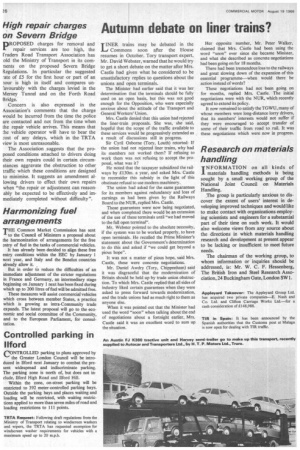Autumn debate on liner trains?
Page 28

If you've noticed an error in this article please click here to report it so we can fix it.
T INER trains may be debated in the L./ Commons soon after the House resumes in October. Tory transport expert, Mr. David Webster, warned that he would try to get a short debate on the matter after Mrs. Castle had given what he considered to be unsatisfactory replies to questions about the unions and open terminals.
The Minister had earlier said that it was her determination that the terminals should be fully used on an open basis, but this was not good enough for the Opposition, who were especially anxious about the attitude of the Transport and General Workers' Union.
Mrs. Castle denied that this union had rejected the liner-train proposals. She was, she said, hopeful that the scope of the traffic available to these services would be progressively extended as a result of discussions still in progress.
Sir Cyril Osborne (Tory, Louth) retorted: If the union had not rejected liner trains, why had its members not worked them? If refusing to work them was not refusing to accept the proposal, what was it?
He noted that the taxpayer subsidized the railways by £130m. a year, and asked Mrs. Castle to reconsider this subsidy in the light of this obstinate refusal to use modern machinery.
The union had asked for the same guarantees for its members against redundancy and loss of earnings as had been given by the Railways Board to the NUR, replied Mrs. Castle.
Those guarantees were now being negotiated, and when completed there would be an extension of the use of these terminals until "we had moved to the full open terminal".
Mr. Webster pointed to the absolute necessity, if the system was to be worked properly, to have open terminals. He recalled the Prime Minister's statement about the Government's determination to do this and asked if "we could get beyond a pious hope".
It was not a matter of pious hope, said Mrs. Castle, these were concrete negotiations.
Mr. Daniel Awdry (Tory, Chippenham) said it was disgraceful that the modernization of Britain should be held up by trade union obstruction. To which Mrs. Castle replied that all sides of industry liked certain guarantees when they were asked to press forward towards modernization, and the trade unions had as much right to them as anyone else.
When it was pointed out that the Minister had used the word "soon" when talking about the end of negotiations about a fortnight earlier, Mrs. Castle said it was an excellent word to sum up the situation. Her opposite number, Mr. Peter Walker, claimed that Mrs. Castle had been using the word "soon" ever since she became Minister, and what she described as concrete negotiations had been going on for 18 months.
There had been tremendous loss to the railways and great slowing down of the expansion of this essential programme—when would there be action instead of words?
These negotiations had not been going on for months, replied Mrs. Castle. The initial negotiations were with the NUR, which recently agreed to extend its policy.
It now remained to satisfy the TGWU, many of whose members were long-distance lorry drivers, that its members' interests would not suffer if they were encouraged to accept transfer of some of their traffic from road to rail. It was these negotiations which were now in progress.




































































































































